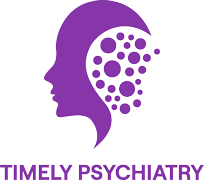Depression can feel like a storm inside your mind. Many people try to fight it hard. But when you fight too much, healing can slow down. We will explore why that happens. We will also share gentle ways to heal and how Timely Psychiatry’s depression treatment can help.
What Is Depression?
Depression is more than feeling sad. It can make each day feel heavy. You might lose interest in things you once loved. You might always feel exhausted or struggle to eat and sleep.
- Emotional Symptoms: sadness, guilt, or emptiness
- Physical Symptoms: fatigue, aches, or changes in appetite
- Thought Symptoms: trouble concentrating, hopelessness
Depression touches every part of your life. It can affect your school, work, and friendships.
Why We Try to Fight Depression
When you feel bad, fighting seems natural. You might push your feelings away. You might tell yourself, “I need to be stronger.” You might keep busy to avoid thinking about how you feel.
Fighting can take many forms:
- Ignoring emotions by keeping very busy.
- Pushing thoughts away with work or social media.
- Pressuring yourself to “snap out of it.”
At first, these moves feel helpful. They block the pain. But over time, they can make things worse.
How Fighting Gets in the Way of Healing
When you fight depression too much, your mind and body stay on alert:
- Stress hormones rise. Cortisol stays high and keeps you in “fight or flight.”
- You feel more tired. Trying to block feelings takes a lot of energy.
- You miss signals. Your body and mind start to send clues about what you need. Fighting can drown out these signals.
Because you are constantly pushing against the storm, you never learn how to calm the storm.
Acceptance: A Gentle Path to Healing
Instead of fighting, try acceptance. Acceptance means saying, “I see these hard feelings. I don’t have to like them. But I can be with them.”
- Name your feelings. Say it out loud: “I feel sad,” or “I feel tired.”
- A few slow breaths can calm your body.
- Sit with your feelings. Imagine it is a visitor you will welcome kindly for a moment.
Acceptance helps you learn from your feelings. It lowers stress. It opens the door to healing.
The Power of Compassion
When you treat yourself with kindness, you give your mind space to heal. Compassion means caring for yourself as you would for a friend.
- Speak kindly. Use gentle words: “It’s okay to feel this way.”
- Comfort your body. A warm drink or a cozy blanket can help.
- Reach out. Talk to someone who listens without judging.
Gentle care helps create safety inside your mind. Safety is where real healing happens.
Mental Health Support at Timely Psychiatry
At Timely Psychiatry, we know healing needs both science and kindness. Our practice offers:
- Medication management customized for you.
- Psychotherapy is like cognitive-behavioral therapy (CBT).
- Lifestyle coaching for sleep, diet, and exercise.
- Group support to share and learn with others.
Each plan is unique. We start with a complete check-up to get to know you well. Then, we build a plan just for your needs.
How Acceptance and Treatment Work Together
Acceptance helps you feel safe with your feelings. Professional treatment guides you toward new skills and relief. Together, they form a strong path:
- Acceptance lets you face feelings without fear.
- Therapy teaches new ways to think and act.
- Medicine can ease symptoms, so you can learn in therapy.
When you stop the battle, you have more energy to learn and grow.
Timely Psychiatry depression treatment in Action
Imagine a garden covered in rocks. Fighting depression is like trying to remove each rock alone by force. Acceptance is like asking for help and learning new tools, a wheelbarrow, gloves, and a friend’s support. The work goes faster and with less pain.
At Timely Psychiatry, we give you the tools:
- Supportive therapy to lift each rock.
- Medication when the load feels too heavy.
- Community, so you never work alone.
This team effort makes healing gentler and more lasting.
When to Reach Out for Help
Sometimes, self-help is not enough. It is okay to ask for help if you:
- Feel you might harm yourself.
- Can’t get out of bed.
- Lose interest in life for weeks.
- Notice your thoughts racing or stuck.
These signs mean you need more support, not that you have failed. Reach out to Timely Psychiatry or your trusted helper.
A Path toward Hope
Healing from depression is more like a journey than a race. You may have steps forward and steps back. But when you stop fighting the challenge and invite support, the path becomes clearer.
Remember:
- Use acceptance to calm the storm.
- Build compassion to feel safe.
- Seek professional care for guidance and relief.
By choosing gentleness over battle, you open the way to real healing.
Conclusion
Depression is hard. Fighting it alone can make healing slower. When you welcome your feelings with acceptance, you give yourself the chance to learn and grow. With the proper mental health support, like Timely Psychiatry depression treatment, you are never alone. Healing comes not from the fight but from understanding, kindness, and support.
If you or someone you love needs help, remember that you deserve care that meets you where you are. Together, we can find calm after the storm.
FAQs
-
How do small daily steps help healing?
Small actions, such as taking five deep breaths, going for a short walk, or chatting with a friend, add up. Over time, they help you feel stronger and calmer.
-
What does it mean to fight depression?
Fighting depression means working to push away sad feelings. Instead of avoiding them, try to name and feel those emotions.

